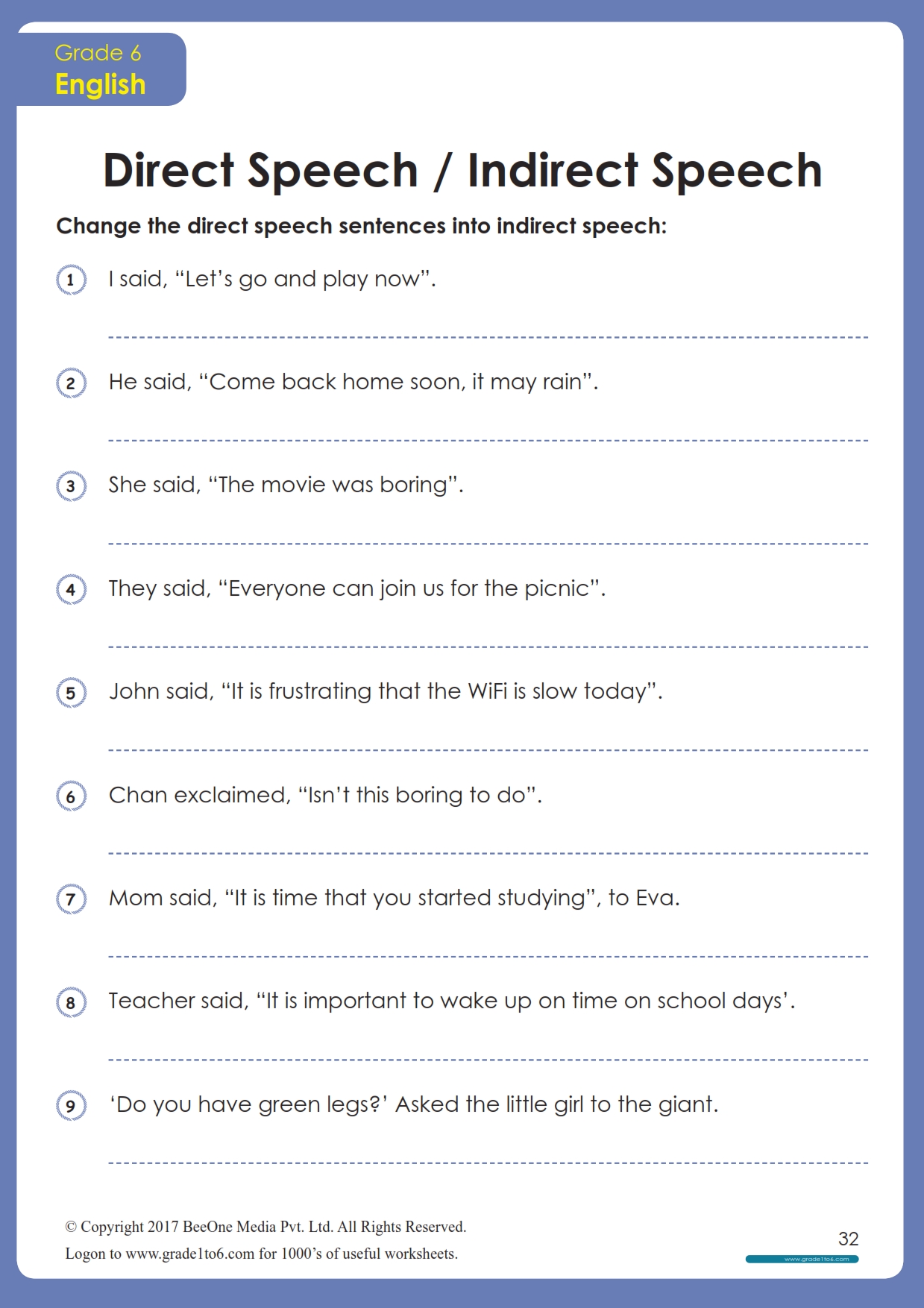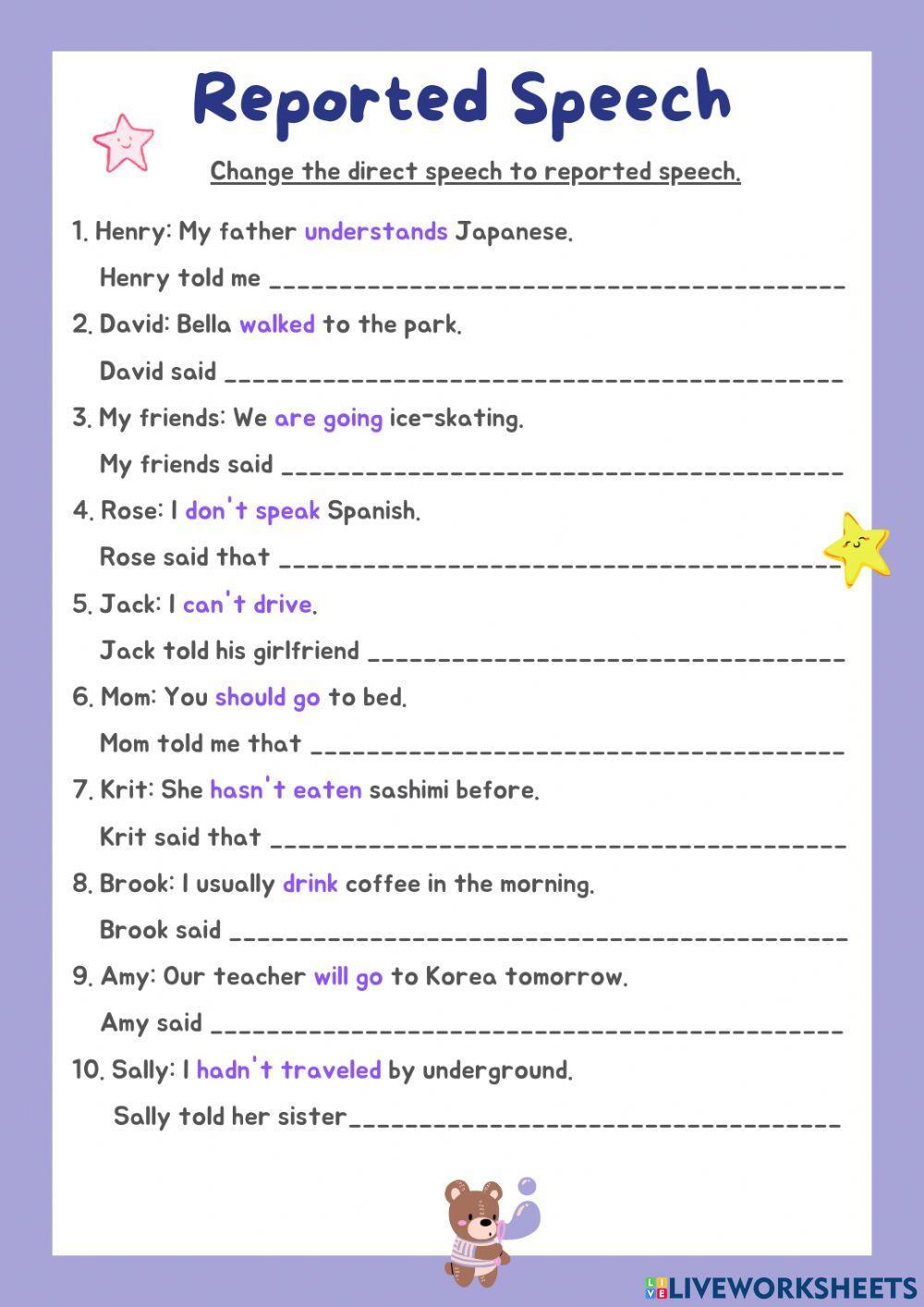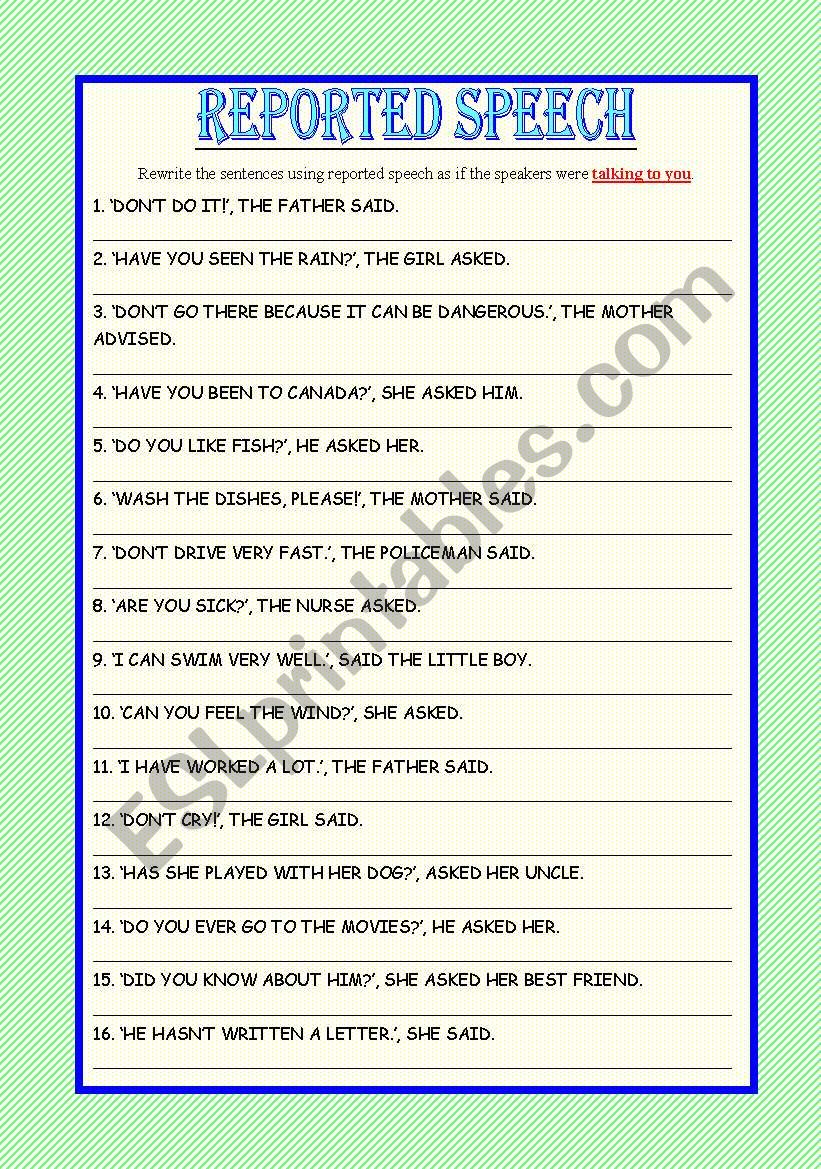
Mastering the Art of Reporting: Advanced Reported Speech Exercises for Students
Reported speech, also known as indirect speech, is a fundamental aspect of English grammar that allows us to convey what someone else has said without directly quoting them. While basic reported speech often involves straightforward tense shifts and pronoun changes, mastering it at an advanced level requires a deep understanding of nuance, context, and a wider array of reporting verbs. For advanced students, the challenge moves beyond simply changing "said" to "told" and delves into intricate transformations involving modals, conditionals, complex sentence structures, and subtle shifts in meaning. This article explores the critical role and design of Reported Speech Exercises for Advanced Students Worksheets, offering insights into their construction, benefits, and practical application.
Why Advanced Reported Speech Poses a Unique Challenge
For learners who have surpassed the intermediate stage, reported speech presents several layers of complexity that demand targeted practice. These challenges include:

- Nuanced Reporting Verbs: Beyond "say" and "tell," advanced students need to confidently use verbs like admit, claim, deny, promise, urge, warn, suggest, advise, accuse, praise, regret, complain, acknowledge, concede, infer, imply, announce, declare, protest, and many more. Each verb carries a specific connotation that affects the meaning and tone of the reported statement.
- Modal Verb Transformations: Modals like can, may, might, must, should, would, could undergo specific changes in reported speech, or sometimes remain unchanged depending on the context and meaning. For instance, "He said, ‘I might go’" can become "He said he might go," but "He said, ‘You must leave’" becomes "He said I had to leave" or "He insisted I leave."
- Conditional Sentence Transformations: Reporting conditional sentences (Type 1, 2, and 3) requires careful attention to tense shifts in both the if-clause and the main clause, often leading to complex structures. "He said, ‘If I win the lottery, I’ll buy a house’" becomes "He said if he won the lottery, he would buy a house."
- Reporting Questions and Commands: Transforming direct questions (yes/no and wh-questions) and commands into indirect forms involves specific structural changes (e.g., using "if" or "whether" for yes/no questions, and infinitives for commands) that can be tricky when combined with complex tenses or multiple clauses.
- Time and Place Adverbial Changes: While basic changes like "now" to "then" are straightforward, advanced scenarios might involve multiple time references or require more flexible interpretations to maintain natural flow.
- Contextual Understanding: The choice of reporting verb, the retention or omission of certain words, and even the overall structure of the reported sentence often depend heavily on the original speaker’s intent, tone, and the broader context of the conversation. Advanced students must learn to infer these elements.
- Reporting Opinions, Feelings, and Indirect Thoughts: Sometimes, we report not just explicit statements but also implied meanings, opinions, or even thoughts. "She felt that…" or "He was of the opinion that…" are examples of such advanced reporting.





Designing Effective Reported Speech Exercises for Advanced Students Worksheets
Effective worksheets for advanced learners must move beyond simple sentence transformations. They should immerse students in authentic, context-rich scenarios that mirror real-world communication. Here are key components and ideas for creating such invaluable resources:

-

Authentic Scenarios and Dialogues:
- News Reports/Interviews: Provide transcripts of interviews or news snippets and ask students to convert them into reported speech for a news article. This emphasizes formal language and summarizing.
- Debates/Discussions: Present a transcript of a debate or a heated discussion and ask students to report the various arguments, counter-arguments, and conclusions, focusing on verbs like argued, contended, refuted, asserted, conceded.
- Legal or Business Contexts: Offer mock testimonies, meeting minutes, or client consultations. Students practice reporting facts, accusations, agreements, and disagreements precisely.
- Literary Extracts: Use dialogue from novels or plays. Students report the conversations, paying attention to the characters’ tones, emotions, and underlying meanings.

-
Focus on Reporting Verbs:
- Verb Choice Drills: Provide a direct statement and a list of reporting verbs (e.g., suggested, complained, boasted, advised, warned). Students choose the most appropriate verb and transform the sentence.
- "Spot the Verb" Activity: Give a reported sentence and ask students to infer what the original direct statement was, and which reporting verb was used (or could have been used).
- Categorization: Students categorize reporting verbs by their function (e.g., verbs for expressing opinion, agreement, disagreement, obligation, suggestion).
-
Complex Sentence Structures:
- Multi-Clause Sentences: Provide direct statements with multiple clauses (e.g., "He said, ‘Although I’m tired, I must finish this report tonight because the deadline is tomorrow, and my boss is very strict’"). Students practice transforming each part accurately.
- Embedded Clauses: Exercises where students report a statement that itself contains reported speech (e.g., "She told me, ‘He said he would call you later’").
-
Conditional and Modal Transformation Specifics:
- Dedicated Drills: Isolate sentences with various conditional types and modal verbs. Students practice the specific rules for each, paying attention to exceptions or contexts where no change occurs.
- Mixed Modals: Sentences combining multiple modals to challenge students (e.g., "He said, ‘I might have been able to help if you had told me earlier’").
-
"Spot the Error" Exercises:
- Present reported sentences with common advanced-level errors (e.g., incorrect tense shift for conditionals, inappropriate reporting verb, wrong pronoun, missing conjunctions). Students identify and correct the mistakes, explaining their reasoning.
-
Transformation and Reversion:
- Direct to Indirect: The classic exercise, but with highly complex direct statements.
- Indirect to Direct: Given a reported speech sentence, students must reconstruct the most plausible original direct statement. This requires critical thinking about the original speaker’s intent and wording.
-
Open-Ended Tasks:
- Summary Writing: Provide a short dialogue or monologue. Students write a summary of it using reported speech, focusing on conciseness and accurate reporting.
- Role-Playing/Improvisation: Students engage in a short improvised conversation. Afterwards, they take turns reporting what their partner said, either to the class or in written form. This bridges the gap between grammar and real-time communication.
- Debate Reporting: Assign a current event. Students research and then report different perspectives on the issue using varied reporting verbs.
The Efficacy of Reported Speech Exercises for Advanced Students Worksheets
Developing robust Reported Speech Exercises for Advanced Students Worksheets is paramount for several reasons:
- Precision and Accuracy: They refine students’ ability to convey information precisely, avoiding ambiguity or misinterpretation.
- Enhanced Fluency: Consistent practice with complex structures helps students internalize the rules, leading to more natural and fluid communication.
- Critical Thinking: Choosing the most appropriate reporting verb or transforming a complex sentence requires analytical skills and a deep understanding of meaning.
- Preparation for Academic and Professional Settings: In academia, reporting sources accurately is crucial. In professional environments, summarizing meetings, relaying client requests, or reporting on discussions demands mastery of indirect speech.
- Confidence Building: Successfully navigating intricate reported speech challenges boosts a learner’s confidence in their overall English proficiency.
Tips for Using Advanced Reported Speech Worksheets
For Students:
- Analyze Context: Before transforming, understand the original speaker’s intention, tone, and the situation. This will guide your choice of reporting verb and structure.
- Focus on Reporting Verbs: Pay close attention to the specific meaning each reporting verb carries. Don’t just default to "said" or "told."
- Break Down Complex Sentences: For long, multi-clause sentences, break them into smaller, manageable parts first, then combine them using appropriate conjunctions.
- Review Modals and Conditionals: Dedicate extra time to understanding how these specific structures change (or don’t change) in reported speech.
- Practice Regularly: Consistency is key. Work through various types of exercises to solidify your understanding.
- Self-Correction: After completing an exercise, compare your answers with the key (if available) and understand why certain transformations are correct or incorrect.
For Teachers:
- Provide Rich Context: Don’t just give isolated sentences. Immerse students in narratives, dialogues, or news reports.
- Encourage Discussion: After exercises, discuss why certain reporting verbs were chosen over others, or why a particular tense shift occurred.
- Differentiate: While these are for advanced students, some may still struggle with specific aspects. Offer supplementary materials or extra practice for those areas.
- Use Authentic Materials: Incorporate excerpts from real news articles, interviews, podcasts, or literary works to make the learning more engaging and relevant.
- Emphasize Nuance: Highlight how subtle changes in reporting verbs can alter the entire meaning or implication of a statement.
- Integrate with Other Skills: Combine reported speech practice with summary writing, debate, or presentation skills.
Conclusion
The efficacy of Reported Speech Exercises for Advanced Students Worksheets lies in their ability to mirror real-world communication, compelling learners to think critically about meaning, context, and linguistic precision. By moving beyond rudimentary transformations and embracing complex scenarios, students can truly master the art of conveying others’ words with accuracy, nuance, and fluency. Ultimately, well-crafted Reported Speech Exercises for Advanced Students Worksheets are not just about grammar rules; they are about fostering sophisticated communication skills essential for academic success, professional development, and effective interaction in a globalized world. By diligently working through comprehensive Reported Speech Exercises for Advanced Students Worksheets, learners can achieve mastery and confidently navigate the intricacies of indirect speech.
